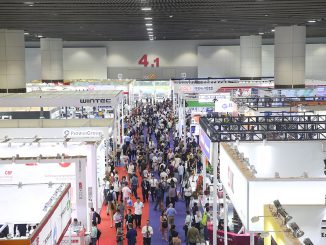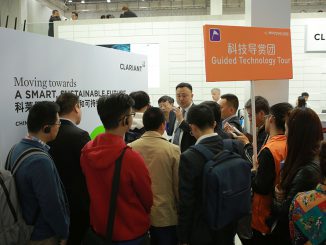Nowadays, when people talk about automobiles, they no longer simply refer to a four-wheel device with seats that are designed to transport individuals from point A to B. Instead, they increasingly refer to environmentally friendly and intelligent vehicles –– often shared with other users –– that must also provide comfortable, personalized, clean and healthy spaces. The rapid promotion of electric, intelligent, networked and shared vehicles is revolutionizing the automotive industry, introducing new business opportunities and challenges. CHINAPLAS 2019, with the theme of “Innovation is Key to the Future”, is going to present a series of high-tech application solutions for that ever-evolving sector.
 The Rise of Intelligent Automotive Surface Interiors
The Rise of Intelligent Automotive Surface Interiors
The adoption of intelligent networks is making cars “smarter,” which will drive future automotive development while also helping to address existing traffic congestion problems. This trend is changing the very nature of automotive interiors. Looking ahead, nearly every surface of an automobile can be “intelligent”. These smart surfaces will help fulfill consumers’ requirements for automobiles, both aesthetically and functionally. The implementation of intelligent networks relies heavily on technological breakthroughs across various fields. New materials, equipment and manufacturing processes are vital to the development of intelligent interiors, which encompass a combination of traditional accessories and electronic parts. To address users’ strong desire for trendiness and personalization, automakers increasingly will use aesthetically pleasing materials in their vehicles’ interiors.
SuZhou ChengFeng Plastic Co., Ltd will present what it calls “chameleon masterbatch” at CHINAPLAS 2019. The material’s most distinguishing characteristic is that, due to its optical properties, products made of it will exhibit different colors when viewed from different directions. Consumers put great importance on the colors of their automotive interior parts, and this material can be used to manufacture variably colored and highly personalized high-tech interiors.
With interior decoration integrated with electronic components, the car will produce a lot of heat when it is running, so high thermal resistance is key to vehicle interiors. The PPA (6T) resin from Zhejiang NHU Special Materials Co., Ltd. can be used to make intelligent surface interiors, due to its outstanding thermal resistance, low water absorption and high dimensional stability.
Intelligent surface interiors are also integrating additional features, such as haptic feedback, which incorporates the need for electrically conductive materials. Graphene is one of the best conductive materials available, yet manufacturing challenges with the material remain, such as ensuring even dispersion when the graphene is mixed with polymers. At the show, exhibitors will present their approaches to solve this problem. Wuxi JuWang Plastic Material Co., Ltd. has made a technological breakthrough regarding the conductivity of graphene in polymer materials, by which the original properties of the polymer can be maintained while good conductivity is achieved.
The Graphene Polymer Composites R&D Center of Shandong Lutai Holding Group has developed an advanced graphene/PVC composite, in which graphene is grafted to the surface of PVC resin, achieving dispersion on the nanoscale for improved conductivity. CHINAPLAS 2019 will feature brilliant solutions that alter the properties of materials with innovative technologies.
Lighting technology is becoming an increasingly essential part of intelligent automotive surface interiors. Ambient lighting and light-guide strips are gaining acceptance as standard configurations for cars from various large brands. The microwave vacuum drying system developed by Tianjin LEVEL Vacuum Drying Equipment Manufacturing Corporation Ltd. increases the transmission of light-guide strips, thereby improving the lighting system.
Speaking of mood lighting, the light booth, a useful tool for standardized visual color appraisal, is not to be forgotten. BYK (Tongling) Co., Ltd. will present its Byko-spectra pro, a light booth mainly used for visual color evaluation in automotive lighting. With a combination of filtered tungsten-halogen lamps and LEDs, the device can produce lights complying with the highest rendering Class A of CIE 51.2 and guarantee accurate color matching.
Another challenge related to the evolution of intelligent automotive interiors involves how to seamlessly integrate electronic components into surface decorative parts. Kurz Group has put forward a solution for integrating intelligence into automotive interior designs. It uses its In-Mold Decoration (IMD) films and transparent, conductive PolyTC films to produce exquisite and metallic-looking touchscreens that can be hidden when they are in standby mode. IMD and In-Mold Labeling (IML) processes can lower costs and improve productivity for makers of such parts.
Moreover, printing ink and related processes are also important for highlighting the functionalities of intelligent interior components. At CHINAPLAS 2019, Enercon Industries will showcase the latest surface plastics processing equipment used in plasma and flame treatments, which enhances the adhesion and bonding of plastics, glass, metals and composites.
Creating a Healthy & Comfortable ‘Second Home’ with High-tech Green Materials
People are paying more attention to how cars, their “second home”, may affect their health.
The long-glass-fiber-reinforced polypropylene composite developed by Shanghai Pret Composites Co., Ltd. has low odor and volatility, which enhances the use of the material for use in the manufacture of auto parts, such as dashboards, center consoles and car doors.
 Guangdong Yizumi Precision Machinery Co., Ltd.’s ReactPro+Hybrid Manufacture System cleverly combines polyurethane (PU) and injection molding materials, improving productivity with a single step, namely in-mold coating, while avoiding the pollution caused by spray painting. The system can produce thinner PU products at a lower cost, and those components also have better appearance and texture, higher scratch resistance, and even some self-healing properties. Moreover, it can be used with 3D printing technology, further expanding the possibilities of injection molding products.
Guangdong Yizumi Precision Machinery Co., Ltd.’s ReactPro+Hybrid Manufacture System cleverly combines polyurethane (PU) and injection molding materials, improving productivity with a single step, namely in-mold coating, while avoiding the pollution caused by spray painting. The system can produce thinner PU products at a lower cost, and those components also have better appearance and texture, higher scratch resistance, and even some self-healing properties. Moreover, it can be used with 3D printing technology, further expanding the possibilities of injection molding products.
The use of aesthetically pleasing materials, low volatile organic compounds (VOCs), and spray-free materials and processes in automotive interior parts are all intended to ultimately improve overall passenger experience and comfort. Asahi Kasei Corporation will present a concept electric vehicle (EV) – named AKXY, meaning “Asahi Kasei x You (customers)” – that was designed based on the platform of EV manufacturer GLM. The concept EV uses as many as 27 materials, products and integrated systems from Asahi Kasei. The company plans to spotlight technologies that help to replace steel with plastics, assist with lightweighting, and enable the use of “artificial leather” to improve passenger comfort.
BASF (China) Co. Ltd., meanwhile, will display three electric vehicles developed in collaboration with Guangzhou Automobile Group Co. Ltd.’s Research & Development Center. These models adopt several of BASF’s innovative materials and solutions, and have a futuristic design, tailor-made for Chinese car owners with diversified lifestyles.
New Materials & Processes Promote Shared Vehicles, Lightweighting
As the sharing economy becomes increasingly prevalent, health-related concerns related to shared vehicles have aroused heated discussions among consumers.
LOTTE Chemical’s antimicrobial material evermoin® can effectively inhibit bacterial and fungal growth and retain antimicrobial ability and stability, thereby helping to minimize any negative health impacts of having various individuals using the same vehicles.
Shenzhen Wote Advanced Materials Co., Ltd. says its PP+EPDM-TD20 material effectively addresses the problems of surface defect and shrinkage in thin-wall injection molded parts made from traditional plastics. The material has been successfully used in various parts of Geely Bin Yue, including in its 2.0 mm frame and back doors, reducing the total weight by almost 20%. Shared vehicles and lightweighting will be major focuses of those designing and manufacturing future vehicles.
Sneak Peek at Concurrent Events
In addition to the display of innovative products and cutting-edge solutions from world-leading exhibitors, CHINAPLAS 2019 also will feature a series of exciting concurrent events. Visitors can explore how innovative technologies can facilitate collaboration between upstream and downstream enterprises, allowing the automotive industry to flourish.
To satisfy the need for green, energy-saving, and lightweight vehicles, the “Automobile and Rail Transit Lightweight Materials and Application Technology Seminar” and “Low VOCs Technology and Application for Automotive & Rail Transit Materials Seminar” will respectively focus on replacing steel with plastics, carbon fibers, fiber-reinforced composites, microcellular foam and thin-wall materials, and technical problems faced by Chinese and overseas manufacturers on lightweighting technology and VOCs from automotive interior. Original equipment manufacturers, representatives of the rail transit enterprises and well-known material manufacturers will be explaining the latest automotive designs, materials and manufacturing processes in detail, and government representatives will be invited to interpret their policy on promoting material application.
Additional compelling sessions will also take place during CHINAPLAS 2019, including: The “2019 Battery Separator and Aluminum Plastics Film Technology and Application Forum”; the “2019 Optical Films for Photoelectric Display and Related Raw Materials Technology and Application Forum”; and “The 3rd Smart Supply Chain Summit 2019”.
In response to the global trend, CHINAPLAS 2019 will host a concurrent event called “Industry 4.0 Factory of the Future”, with major players in Industry 4.0, including iPlast 4.0, EUROMAP and Germany’s VDMA. There will be two themed areas –– “Manufacturing Intelligence Control Room” and “Smart Factory” –– demonstrating intelligent solutions in real-life settings with a daily display of 15 scenarios related to production shop floor, business operations and supply chain management under Industry 4.0 protocols.
Recognizing the key role of design in the product development process, CHINAPLAS 2019 will join hands with the Guangdong Industrial Design Association to organize the event “Design x Innovation”, comprising three parts – “CMF Inspiration Walls”, “Design Forum” and “CHINAPLAS Designers’ Night”.
The “Plastics Recycling & Circular Economy Conference and Showcase”, meanwhile, will take place in Guangzhou on May 20 (one day before CHINAPLAS 2019 opens) with the themes of “Material Science for Sustainability”, “Recycling Technology” and “Environmental Packaging”, all of which will focus on issues that greatly concern environmentally minded participants in the industry.
The show organizer, Adsale Exhibition Services Ltd., is again organizing “Tech Talk” –– a series of open-forum talks on the show floor that will shine a light on several key exhibition highlights, and showcase presentations about some of the hottest products and technologies of the year. These sessions will not only reveal important technological breakthroughs achieved by the exhibitors and other plastics and rubber industries enterprises, but will also provide a platform for professional buyers to quickly get up to speed about these latest developments.
CHINAPLAS 2019 returns to the China Import and Export Fair Complex, Pazhou, in Guangzhou from May 21-24. The show will focus on “Smart Manufacturing”, “Innovative Materials” and “Green & Circular Solutions” to effectively address the most pressing needs of high-end downstream buyers.
This high-quality extravaganza for the plastics and rubber industries will feature more than 250,000 square meters of exhibition space. The show will attract more than 3,500 leading exhibitors from all over the world, including BASF, DuPont, Kingfa, LG Chem, Teijin, Pret, Wote, Lehvoss, Songwon, Arburg, ABB, Haitian, Yizumi, KraussMaffei, Engel, Kurz and Dekuma, and will introduce plastics machines, materials and technical solutions to buyers from around the world.
Adsale expects CHINAPLAS 2019 to attract more than 180,000 professional visitors from 150 countries and regions. The show typically draws officials from a diverse cross section of well-known automotive brands and enterprises, such as the GAC, SAIC, Dongfeng Motor, Geely, BAIC, General Motors, Honda, Yutong, SAIC Volkswagen, FAW, Changan, NIO, Magna, PATAC, Bosch, Valeo, Minth and Hella.
Visitors can enjoy admission discount through online pre-registration from now till May 13, 2019, at an early-bird rate of USD 7.5 for a four-day pass. To pre-register, please visit www.ChinaplasOnline.com/prereg. For more information about CHINAPLAS 2019, please visit www.ChinaplasOnline.com.










